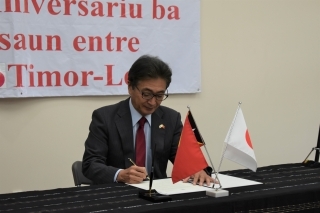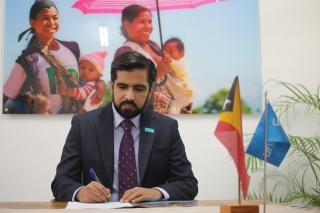Government of Japan and UNICEF sign USD 3 million partnership agreement to support nutrition programming in Timor-Leste
2022/3/2
 Mr. Masami Kinefuchi, the Ambassador of Japan to Timor-Leste
Mr. Masami Kinefuchi, the Ambassador of Japan to Timor-Leste
 Mr. Bilal Durrani, UNICEF’s Country Representative to Timor-Leste
Mr. Bilal Durrani, UNICEF’s Country Representative to Timor-Leste
DILI, 2 MARCH 2022 –The Government of Japan and the United Nations Children’s Fund (UNICEF) signed an agreement for USD 3 million that would support nutrition programming in Timor-Leste over a two-year period (2022 and 2023). The partnership would address child and maternal malnuturition, including stunting, wasting and micronutrient deficiencies. The programme will focus on promoting better nutrition practices for children (from conception to 24 months), adolescents and mothers; treating children suffering from acute malnutrition; strengthening national systems and community networks; and helping reverse the high levels of malnutrition among children under five. Specific interventions will be implemented in Covalima, Lautem, Liquica and Manufahi municipalities and RAEOA Oe-cusse.
“We have made progress in reversing some of the negative trends of malnutrition in Timor-Leste, including stunting and wasting, and moving in the right direction now thanks to our work with UNICEF and other partners. But a lot more needs to be done to accelerate progress to address malnutrition in the most critical time of children’s lives, before they turn two years of age, and ensure they survive, avoid stunting and wasting, and are ready for schools and lifelong learning,” said H.E. Dra. Odete Maria Freitas Belo, Minister of Health. “This generous support from the Government of Japan will help us collectively improve the nutrition status of infants, children, adolescents, and mothers.”
Stunting declined from 50.2 per cent to 47.1 per cent, while wasting reduced from 11 to 8.6 per cent between 2013 and 2020.
However, malnutrition, particularly maternal and child undernutrition, remains the single greatest contributor to premature death and disability in Timor-Leste. With almost every second child being stunted (47 percent of children under five years of age), Timor-Leste has the fourth highest child stunting rate in the world with a rate that is more than double the global average and the third highest prevalence of stunting in the East Asia Pacific region.
His Excellency, Taur Matan Ruak, the Prime Minister of the Republic of Timor-Leste called for a single, common, costed, measurable multisector consolidated national action plan for nutrition and food security (CNAP-NFS) to align partners and collectively work toward achieving SDG2, and and Maternal Infant and Young Child Nutrition targets. The National Health Sector Nutrition Strategic Plan (NHSNSP) 20202025, led by the Ministry of Health, forms the foundation of the CNAP-NFS.
“Nearly 80% of a human’s brain develops by the age of two, and if stunting and wasting are not addressed in the first two years of a child’s life, it is already too late,” said Mr. Bilal Durrani, UNICEF’s Country Representative to Timor-Leste. “Children who are undernourished are more likely to die than their well-nourished peers. Those who survive are at a higher risk of stunting and wasting – and face life-changing deficiencies in their essential nutrients. Malnutrition in children affects cognitive and physical development, adversely impacting on a child’s education and employment prospects.”
Key barriers to improving nutrition include inadequate infant and young child feeding practices, inadequate knowledge of maternal nutrition, childhood illnesses, and low access to water, sanitation and hygiene.
Under the project, Child Nutrition Improvement in Timor-Leste, Japan and UNICEF will support the Government of Timor-Leste’s efforts to accelerate reduction of undernutrition priorities and contribute to the reduction of stunting, underweight and wasting by end of 2023 among children 0-23 months. Efforts will also be made to improve coverage of micronutrient supplementation among adolescent girls through a high-impact nutrition intervention package in health facilities and schools and improve the delivery of nutrition interventions for mothers. The project will help treat 11,962 children suffering from acute malnutrition, provide counselling for 12,000 pregnant women, provide 20,000 adolescents with micronutrient supplements, and support other nutrition interventions.
“Japan hosted the International Nutrition Summit late last year, and we were impressed by the strong commitment made by the Prime Minister, H.E.Taur Matan Ruak to improve the nutrition situation in Timor-Leste in his speech at the opening session. Japan continues to support Timor-Leste's efforts in bringing better nutrition status to the population. On behalf of the Government of Japan, I am pleased to sign a new contract with UNICEF for this USD 3 million assistance for the nutrition programme, on top of another USD 3 million assistance that we have just signed with WFP for the food security programme. This programme especially focuses on children, adolescents and mothers, as good nutrition and balanced diet in an early stage of life are essential for ensuring healthy growth of humans. I hope Japan's assistance to this programme will accelerate the improvement of the nutrition situation in this country,” said Mr. Masami Kinefuchi, the Ambassador of Japan to Timor-Leste.
The partnership agreement was signed by Mr. Masami Kinefuchi, Ambassador of Japan to Timor-Leste on behalf of the Government of Japan, and Mr. Bilal Durrani, UNICEF Country Representative to Timor-Leste on behalf of UNICEF.
“We have made progress in reversing some of the negative trends of malnutrition in Timor-Leste, including stunting and wasting, and moving in the right direction now thanks to our work with UNICEF and other partners. But a lot more needs to be done to accelerate progress to address malnutrition in the most critical time of children’s lives, before they turn two years of age, and ensure they survive, avoid stunting and wasting, and are ready for schools and lifelong learning,” said H.E. Dra. Odete Maria Freitas Belo, Minister of Health. “This generous support from the Government of Japan will help us collectively improve the nutrition status of infants, children, adolescents, and mothers.”
Stunting declined from 50.2 per cent to 47.1 per cent, while wasting reduced from 11 to 8.6 per cent between 2013 and 2020.
However, malnutrition, particularly maternal and child undernutrition, remains the single greatest contributor to premature death and disability in Timor-Leste. With almost every second child being stunted (47 percent of children under five years of age), Timor-Leste has the fourth highest child stunting rate in the world with a rate that is more than double the global average and the third highest prevalence of stunting in the East Asia Pacific region.
His Excellency, Taur Matan Ruak, the Prime Minister of the Republic of Timor-Leste called for a single, common, costed, measurable multisector consolidated national action plan for nutrition and food security (CNAP-NFS) to align partners and collectively work toward achieving SDG2, and and Maternal Infant and Young Child Nutrition targets. The National Health Sector Nutrition Strategic Plan (NHSNSP) 20202025, led by the Ministry of Health, forms the foundation of the CNAP-NFS.
“Nearly 80% of a human’s brain develops by the age of two, and if stunting and wasting are not addressed in the first two years of a child’s life, it is already too late,” said Mr. Bilal Durrani, UNICEF’s Country Representative to Timor-Leste. “Children who are undernourished are more likely to die than their well-nourished peers. Those who survive are at a higher risk of stunting and wasting – and face life-changing deficiencies in their essential nutrients. Malnutrition in children affects cognitive and physical development, adversely impacting on a child’s education and employment prospects.”
Key barriers to improving nutrition include inadequate infant and young child feeding practices, inadequate knowledge of maternal nutrition, childhood illnesses, and low access to water, sanitation and hygiene.
Under the project, Child Nutrition Improvement in Timor-Leste, Japan and UNICEF will support the Government of Timor-Leste’s efforts to accelerate reduction of undernutrition priorities and contribute to the reduction of stunting, underweight and wasting by end of 2023 among children 0-23 months. Efforts will also be made to improve coverage of micronutrient supplementation among adolescent girls through a high-impact nutrition intervention package in health facilities and schools and improve the delivery of nutrition interventions for mothers. The project will help treat 11,962 children suffering from acute malnutrition, provide counselling for 12,000 pregnant women, provide 20,000 adolescents with micronutrient supplements, and support other nutrition interventions.
“Japan hosted the International Nutrition Summit late last year, and we were impressed by the strong commitment made by the Prime Minister, H.E.Taur Matan Ruak to improve the nutrition situation in Timor-Leste in his speech at the opening session. Japan continues to support Timor-Leste's efforts in bringing better nutrition status to the population. On behalf of the Government of Japan, I am pleased to sign a new contract with UNICEF for this USD 3 million assistance for the nutrition programme, on top of another USD 3 million assistance that we have just signed with WFP for the food security programme. This programme especially focuses on children, adolescents and mothers, as good nutrition and balanced diet in an early stage of life are essential for ensuring healthy growth of humans. I hope Japan's assistance to this programme will accelerate the improvement of the nutrition situation in this country,” said Mr. Masami Kinefuchi, the Ambassador of Japan to Timor-Leste.
The partnership agreement was signed by Mr. Masami Kinefuchi, Ambassador of Japan to Timor-Leste on behalf of the Government of Japan, and Mr. Bilal Durrani, UNICEF Country Representative to Timor-Leste on behalf of UNICEF.
